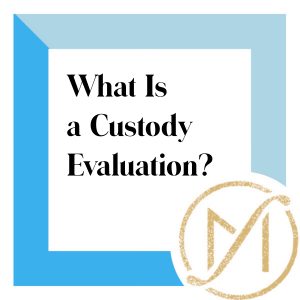What is a Custody Evaluation?

In some Connecticut divorce and family law cases, there is a custody evaluation. Not every case includes a custody evaluation — it only happens when the parents (and their lawyers) or the Court decide that a custody evaluation is appropriate. It generally occurs either when legal or physical custody is at issue, or where there is a significant custody dispute including, for example, a parent’s proposed potential post-judgment out-of-state relocation with the children.
Who Conducts a Custody Evaluation?
A custody evaluation is performed by a neutral mental health professional — often a social worker or psychologist or social trained to perform evaluations in litigated custody cases.
What’s the Purpose of a Custody Evaluation?
The purpose of a custody evaluation is to help resolve custody disputes.
What Happens in a Custody Evaluation?
The custody evaluator:
- Gathers information about the family that has bearing on the specific area of dispute
- Interprets that information for the Court, and,
- Prepares a report with recommendations to the Court
Evaluators prepare written reports explaining their findings in detail. They generally contain background on meetings and conversations with the parents, children, and other sources, as well as the recommendations themselves. In addition, the report from a private custody evaluation includes the evaluator’s interpretation of psychological testing results.
Who Determines Whether a Custody Evaluation Will Take Place?
The short answer is the Court ultimately orders a Custody Evaluation.
Many custody evaluations begin with an agreement between the parents. When parents agree to have a custody evaluation, experienced divorce attorneys can often help the parties reach an agreement on what type of custody evaluation is appropriate. If so, the parties present a stipulation about the custody evaluation to the Court for approval.
In other cases, of course, the parents disagree about having a custody evaluation. Or, sometimes they agree that there should be a custody evaluation, but disagree about what type. In either case, parents file a motion requesting that the Court order a custody evaluation. Then, the Judge decides whether to order an evaluation and, if so, what type.
What Are the Types of Custody Evaluations?
There are two types of custody evaluations in Connecticut: Family Services Evaluations and Private Custody Evaluations. In both, a custody evaluation is performed by a neutral mental health professional — often a social worker or psychologist or social trained to perform evaluations in litigated custody cases.
Family Services
A Family Relations Officer from Family Services, part of the Connecticut Judicial Branch, conducts Family Services Custody Evaluations. Family Services Evaluations are performed at no cost to the parents.
Private
First, in a private custody evaluation, a forensic psychologist performs the evaluation, as opposed to the Family Relations.
Second, in contrast to Family Services Custody Evaluations, the parties pay for private custody evaluations.
Finally, in addition to the steps that Family Relations Officers take to gather information for their evaluation, private custody evaluators will often also conduct psychological testing of the parents and children. The forensic psychologists analyze these results and use them to inform their recommendations on custody.
Custody Evaluation Vs GAL
A Guardian ad Litem is someone who represents a child’s best interests when parents are unable to resolve a parenting or child-related dispute. One of the things that experienced divorce attorneys consider when deciding whether to request a custody evaluation, is whether a GAL or custody evaluation (or theoretically both) will be more effective.
There are many factors to consider when deciding — including timeline and expense — and it really depends on the specifics of your case.
Next Steps
For more information about Connecticut divorce and family law, check out our Divorce Information and Facts. At Freed Marcroft, we have helped hundreds of people move forward to a better life. At our first step, the Goals & Planning Conference, we start by guiding you through a process to figure out your goals. If you decide that divorce is part of what you need to do to get you to the future you want, we can help you. If it isn’t, we will support you and help you figure out what you need to get you there instead.
Let’s keep you moving forward. Contact us today.








